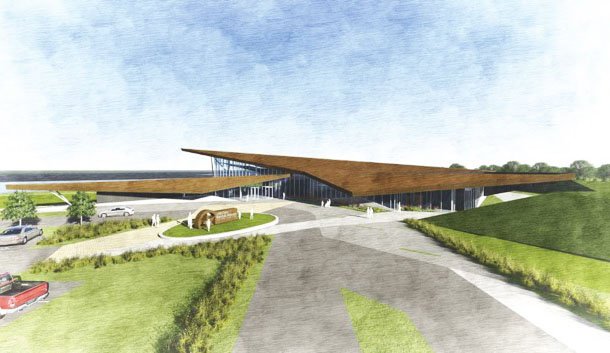FORT SMITH -- Officials with the U.S. Marshals Museum are scheduled to ask city directors Tuesday to call a March election to allow city residents to vote on passage of a temporary 1-percent sales tax to raise up to $16 million to pay for completion of the museum.
The museum's proposal was posted Friday afternoon on the city's website as an agenda item for Tuesday's study session, at which the directors discuss but do not vote on agenda items.
A memo in the agenda packet from City Administrator Carl Geffken said the meeting will give museum officials the opportunity to discuss the proposal with directors. No date has been set to vote on the proposal.
Museum officials could not be reached for comment Friday night. Officials have said they are aiming to open the museum Sept. 24, the 230th anniversary of President George Washington's establishment of the nation's oldest federal law enforcement agency.
If the tax is approved in a March 12 election, the proposal said, it would go into effect July 1 and expire March 31, 2020. The proposal said the Fort Smith city government would have no control over how the tax money is spent.
The museum proposed the formation of a public facilities board that would own the museum building and grounds if the sales tax passes. That board would lease the building to the museum.
"The [U.S. Marshals Museum] Board of Directors would operate the museum," the proposal said. "The Fort Smith Board of Directors would exercise no controls over the operation of the museum."
According to the proposal, the public facilities board would be created by city ordinance and be composed of "community residents." The public facilities board would buy the museum building and grounds for the amount of sales tax money raised and would lease the building to the museum.
"The rights and obligations of the [public facilities board] and the [U.S. Marshals Museum] would be spelled out in legally enforceable contracts," the proposal said.
The Arkansas Constitution and Arkansas law require that public funds, such as those generated by the proposed sales tax, be spent for public purposes, the proposal said. If funds are expended for a public facility, the proposal said, the property may be owned by a public facilities board.
The 11-page proposal ended with a call for help from the museum to the people of Fort Smith.
"The people of Fort Smith value their historic downtown, their connectivity to their Marshals Service past, and see the value of preserving their culture for future generations," the proposal said. "Economic benefits to downtown revitalization, riverfront development, and the national recognition flowing from having the United States Marshals Museum in Fort Smith are powerful reasons why we need to fully fund the museum without further delay."
The U.S. Marshals Service chose Fort Smith in early 2007 as the site of its national museum to tell the Marshals Service's story. The Westphal family of Fort Smith donated the land for the museum on the banks of the Arkansas River north of downtown, and efforts began in 2009 to raise funds for what has become a $52.4 million project.
So far, according to the museum's proposal, $35.4 million has been raised through cash, pledges and the land donation from more than 2,000 donors.
That leaves a total of $17 million left to be raised unless the sales tax is passed, which would save almost $1.7 million in interest on potential loans the museum would not have to obtain.
The proposal estimated it would need $15,363,113 in sales tax money to pay for the remaining work to open the museum. It broke the costs down to $9,421,800 for production of the museum experience (exhibits); $2.5 million for working capital; $2,233,363 for furniture, fixtures and equipment; $807,950 for startup costs; and $400,000 for contingencies.
Despite economic and geographic "headwinds," the proposal said, fundraising efforts have allowed construction to begin in July on the $19.1 million building. Museum officials invited reporters to the site last month to witness the erection of the first steel of the structure.
Even with the infusion of sales tax money, the proposal said, the museum will need more capital gifts to build an endowment to provide long-term financial stability.
State Desk on 12/10/2018
